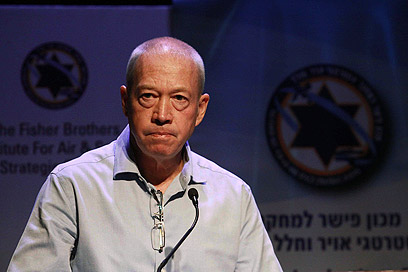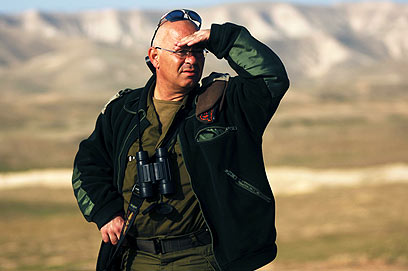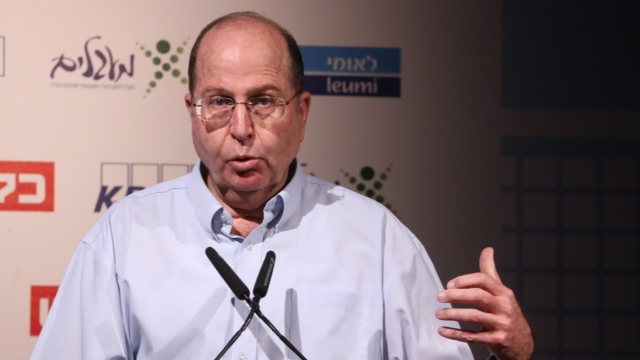
Bad blood and intrigue: Campaign for next IDF chief
Eizenkot has already garnered defense minister's support, but old grudges could see Yair Naveh or even northern commander Yair Golan replace Benny Gantz as IDF chief.
IDF Chief of Staff Benny Gantz will end his term on February 14, 2015 – but the battle to name his successor has already begun. The previous race to head Israel's army was marred by an affair involving plotting that could have put the House of Borgia to shame, and this round looks set to be no less bitter or contentious.
The frontrunners are the current deputy chief of staff, Major General Gadi Eizenkot, and his predeccessor Major General Yair Naveh. Of the two Golani warriors, Defense Minister Moshe Ya'alon is said to favor Eizenkot. The chief of staff is appointed once every three years, with the government often extending the term to four, and on sevearl occasions, even five years. Gantz has been in the position since 2011.
Ya'alon will invite the leading candidates for a formal meeting immediately after the spring holidays; at the moment there are no plans to include the former head of the Southern Command, Major General Yoav Galant, whose last run for the position ended in ignominy after a land zoning scandal over the construction of his private home.
Meanwhile, the massive, bitter rift between Ya'alon and Galant could have ramifications for the race, as Ya'alon is thought to be willing to move heaven and earth to deny Galant the honor.
Bad blood
The general consensus is that Ya'alon sees Galant, who served as Ariel Sharon's military secretary and part of his inner circle, as the man who deprived him of his fourth year as chief of staff, when he recommended that Sharon appoint Dan Halutz, then head of the Air Force, in the wake of the 2005 Gaza disengagement from Gaza. Now, it seems, as defense minister, Ya'alon could well decide to return the favor.
Regardless of the bad blood with Galant, Ya'alon nonetheless prefers Eizenkot, who, like chief rival Naveh, comes from the Golani Brigade.
The top brass of the general staff say that as far as Ya'alon is concerned, Eizenkot's ascent is a done deal. They say this much is clear from Ya'alon's body language, word choice and the level of respect he pays to Eizenkot. Ya'alon, the generals claim, is grooming Eizenkot to succeed Gantz.
Eizenkot is not a handsome man, nor is he even an very highly decorated officer, but if a poll were conducted among IDF's combat commanders as to who they would follow into battle, he would easily win.
However, there are some who aim to block the appointment on the basis of Eizenkot's involvement in what has become known as the Harpaz affair, regardless of the fact that the police cleared Eizenkot of all wrongdoing.
The affair was named for Lieutenant Colonel Boaz Harpaz, a reservist officer and ally of then-IDF chief Gabi Ashkenazi, Harpaz forged a letter purporting to be from the office of then-defense minister Ehud Barak, which apparently showed how Ashkenazi was plotting to smear Galant's bid to become the chief of staff.
Barak backed Galant's nomination and Ashkenazi preferred Eizenkot; the ensuing behind-the-scenes battle still casts a shadow over in the current race. It seems that Barak's attempt to keep Eizenkot out has yet to run out of steam.
Some in the general staff say there is already a team of lawyers preparing to take the fight against Eizenkot's appointment to the High Court, if Eizenkot survives the committee to vet appointments headed by retired judge Jacob Turkel.
If Eizenkot does get the nod from the Turkel Commission, opponents of his appointment are to base their complaints on his alleged close relationships with some of those involved in the Harpaz affair (among them Gabi Siboni, who "leaked" the fake document at the center of the scandal), as well as alleged false testimony he gave to the police.
Ya'alon and Eizenkot for their part will claim that the latter was cleared of all wrongdoing, not just by the police but also by the attorney general, the same Yehuda Weinstein who blocked Galant's appointment for alleged misconduct during the construction of his home.
But even if Eizenkot's candidacy is shot down, Naveh's promotion is far from certain. There could be a third horse in the race, in the shape of GOC Northern Command Major General Yair Golan. Unsurprisingly, Golan has his own detractors, who argue he is not a good option for the IDF top spot; others maintain, however, that Golan could lead the IDF to make much-needed changes.
Galant, the supposedly passive observer, has already expressed his willingness to step into the office he came close to filling in the last selection. "If the government calls on me, I will report for duty," he says.
He hopes Prime Minister Benjamin Netanyahu will pressure Ya'alon to change his mind. But the chances of such an eventuality seem slim - it is rumored that Netanyahu has already thrown his support behind Eizenkot.














